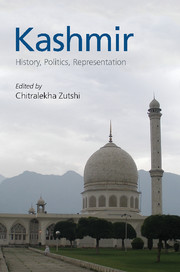Book contents
- Frontmatter
- Dedication
- Contents
- Acknowledgements
- Map 1 Pre-Partition Jammu and Kashmir
- Map 2 Contemporary Kashmir
- Introduction: New Directions in the Study of Kashmir
- PART I HISTORY
- PART II POLITICS
- PART III REPRESENTATION
- 11 Embedded Mystics: Writing Lal Ded and Nund Rishi into the Kashmiri Landscape
- 12 Producing Paradise: Kashmir's Shawl Economy, the Quest for Authenticity and the Politics of Representation in Europe, c. 1770–1870
- 13 The Kashmiri as Muslim in Bollywood's ‘New Kashmir films’
- 14 The Witness of Poetry: Political Feeling in Kashmiri Poems
- Contributors
- Index
13 - The Kashmiri as Muslim in Bollywood's ‘New Kashmir films’
from PART III - REPRESENTATION
Published online by Cambridge University Press: 03 August 2019
- Frontmatter
- Dedication
- Contents
- Acknowledgements
- Map 1 Pre-Partition Jammu and Kashmir
- Map 2 Contemporary Kashmir
- Introduction: New Directions in the Study of Kashmir
- PART I HISTORY
- PART II POLITICS
- PART III REPRESENTATION
- 11 Embedded Mystics: Writing Lal Ded and Nund Rishi into the Kashmiri Landscape
- 12 Producing Paradise: Kashmir's Shawl Economy, the Quest for Authenticity and the Politics of Representation in Europe, c. 1770–1870
- 13 The Kashmiri as Muslim in Bollywood's ‘New Kashmir films’
- 14 The Witness of Poetry: Political Feeling in Kashmiri Poems
- Contributors
- Index
Summary
Introduction
The prominent release in early 2010 of My Name is Khan, the Shahrukh Khan film that potently brings together autism, 9/11 and Indian Muslim identity, has prompted several commentators on Indian cinema to return to an old question: the portrayal of the Indian Muslim as a minority subject within Bollywood (Kesavan, 2007). Earlier an operation to be delicately executed in step with the Nehruvian consensus on secularism – an emblematic film here being Amar Akbar Anthony – the relationship between cinema and Indian Muslim identity (Islam, 2007; Kazmi, 1994) took on an even more complicated turn after 9/11 and 26/11 (the attack on the Indian Parliament on 26 November, 2008). In the episode entitled ‘Hindi Films: Stereotyping Muslims’ of her signature television programme We the People, journalist Barkha Dutt (2010) can now add the ‘ominous terrorist’ to the list of stereotyped Muslim characters that the Indian media circulates, such as ‘the drunk nawab’ or ‘the benevolent chacha’ (uncle). If, according to the anonymous article ‘Indian Muslims’ (2010), the average Indian Muslim viewer appreciated My Name Is Khan as a film about terrorism ‘where the central character that stands out against this does it not in spite of his upbringing and religion but because of it’, this appreciation is all the stronger because of several films prior to its release that attempted to narrativize the implications of the War on Terror for India.
In these films, notably New York, Aamir and Kurbaan, the protagonists were Indian Muslims caught up in the aftermath of terror; but the filmmakers failed to break out of the assumption that for an Indian Muslim to display publicly any relationship or attachment to everyday Islamic tenets was immediately to render him or her susceptible to ‘terrorist’ ideologies. Indeed, for Bollywood, practicing terrorist and practicing Muslim would seem collapsible categories. If, as Arun Venugopal (2010) opines, ‘In Indian movies, the terrorist isn't some veiled abstraction: He's your brother (Fiza, 2000) or house guest (Black and White, 2008) or the woman you couldn't live without (Dil Se, 1998)’, it should be added that in all these ‘terrorist’ films, apart from Dil Se (Kabir, 2003), the terrorist protagonist is Muslim.
- Type
- Chapter
- Information
- KashmirHistory, Politics, Representation, pp. 284 - 300Publisher: Cambridge University PressPrint publication year: 2017
- 1
- Cited by



